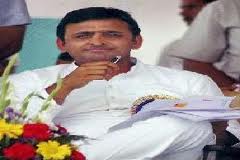
Lucknow, May 16: Uttar Pradesh Chief Minister Akhilesh Yadav on Tuesday said that financial irregularities were all-pervasive during the five-year tenure of Mayawati and affected practically every segment of the society. Yadav said that over Rs 40,000 crore were misappropriated in schemes ranging from eco parks to the NRHM.
The government would soon set up a commission to bring the probes into various scams under a single investigating authority along with inquiries recommended by the Lok Ayukta against a number of ministers in the previous government, Yadav said on Tuesday here.
People usually tend to take into account the money spent on a project as its net worth of the scam. But the actual cost of these projects turn out to be much higher, Akhilesh said. "When government makes such assessments, it includes the cost of land used, value of the existing structure razed to the ground for the new project, the repeated changes in design and construction work - all of this directly amounts to losses to the state exchequer," the chief minister said.
As per the government's estimates, the total worth of scams during the BSP rule is over Rs 40,000 crore, which is almost equal to the annual outlay for the state during 2011 - 2012 and is nearly one-fourth of the state's annual budget of Rs 1.89 lakh crore.
The major scams which had allegedly taken place during the Mayawati regime and are under the SP government's scanner are NRHM scam, toilet scam, elephant statues scam, Noida land scam, High Security Registration Plates (HSRP) tender scam, seed scam, etc. Investigations and inquiries are under way in each of these scams and in 50% of the cases, arrests have also been made leaving hardly any scope of doubt over allegations of misappropriation.
Though investigations into these scams have led to the arrest of bureaucrats and even senior ministers in the BSP government, the investigators are yet to establish a possible direct link between the misappropriations and the then chief minister Mayawati.
However, senior SP ministers have started accusing Mayawati of being directly involved in the scams. On Monday, health and family welfare minister Ahmed Hasan said: "Mayawati's name is also figuring in the NRHM scam." Another senior minister Azam Khan said that the allegations being levelled by the SP all these years are turning out to be true.
On Tuesday, former UP chief minister Rajnath Singh joined the chorus saying: "It is virtually impossible that such huge amounts were swindled and the then chief minister and Bahujan Samaj Party chief Mayawati was neither aware nor involved in the whole thing. Such huge sums of money cannot be swindled without the consent and interest of the chief minister," Rajnath Singh said on Tuesday.
But the BSP says that the accusations of scams were a mere political gimmick. Party's state president Swami Prasad Maurya said Mayawati had been the only chief minister till date to have taken stringent action against her own ministers and MLAs when ever they were found taking the law in their hand. "Name me one chief minister to have done this?" he questioned. "All this hype about the scams is being cooked up only to cover-up the government's failure in controlling the crime situation in the state," the SP state president said.





Comments
Add new comment